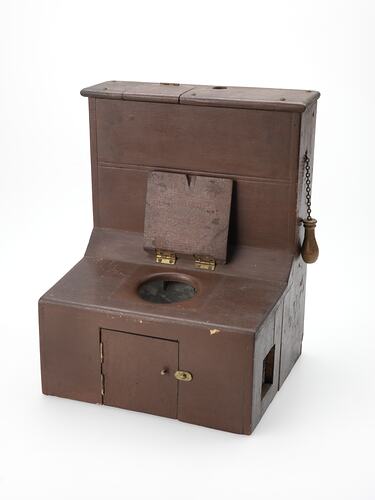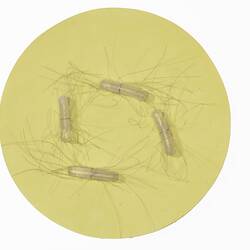Summary
Alternative Name(s): Toilet, Earth Closet
Miniature salesman's sample 'Sanitary Closet' (toilet) with original advertising for T. Headen & Son, 34 Queen Street, Melbourne, housed in original leather case. It was probably made around the early 1890s when promotion of the technology was at its most active. An advertisement pasted on the back of the model lists prices ranging from £4 10s to £6 10s for models with cabinets in deal, Kauri pine and cedar, either varnished or polished. As the 1890s progressed, construction of the Melbourne sewerage scheme made earth closets such as this increasingly redundant.
Thomas Headen, founder of the business T. Headen & Son, arrived in Victoria on the sailing ship 'Australia' at Williamtown in the later part of 1852, as part of the first wave of gold rush immigrants, after working his passage out from England. Born in Birkenhead on 24 October 1831, he had trained as a bricklayer before emigrating, and readily found employment in the building trade at St Kilda, earning 30 shillings a day (compared with the 4s/day he had earned at home). After accumulating some capital he and a brother spent several months of 1854 on the diggings at Creswick, without success. On returning to Melbourne he met and married Miss Sarah Camm in Ballarat before settling in the new suburb of Prahran, where he established a successful building and contracting business, primarily constructing residential and commercial properties. Two of his sons were to later join business as partners, which by the late 1880s was advertising itself as T. Headen & Sons, with offices at 51 High Street, Prahran, and later 94-96 King Street, Melbourne. After the collapse of the land boom in the mid 1890s, Headen moved to the Western Australian goldfields for a period to find work, but he returned to Victoria by the early 1900s, retiring to his residence at 34 Queen Street, St Kilda.
During the 1850s and 1860s most properties in central Melbourne and the burgeoning inner suburbs were built with brick or bluestone lined cesspits for the disposal of both toilet waste (or 'night soil') and general household refuse. As municipal councils become increasingly concerned about the sanitation risks and offensive smells created by cesspits, concerted campaigns were mounted to fill in the aging cesspits and replace them with sanitary pans that were regularly emptied by nightsoil contractors. Two different systems were typically employed utilising either wet pans or dry pans (also known as 'earth closets'). In December 1875, the Prahran Town Council first entered into a contract with a Mr Schmett 'to empty and cleanse earth closets and pans' for ratepayers once a week, for modest fee, with the new service commencing on 1 January 1876. It was in the context that Thomas Headen & Sons appear to have developed their patent 'Simplex' brand earth-closet design that was promoted to 'Architects, Coffee Palace Companies, Family Hotels and the Public Generally', through a series of advertisements in local newspapers. A further patent followed in 1892, for an improved 'self closing' design that automatically discharged the deodorising 'earth' into the pan after each use. In August 1891, it was announced that the firm had won a contract to supply 32 of 'their patent automatic sanitary closets' for the new railway offices in Spencer Street, with the reporter commenting that:
'These closets are so ingeniously contrived that not only do the lids close automatically after use, but there is also an automatic discharge of disinfectant from a reservoir at the back, thus effectually providing against any smell arising from the closet through the negligence of its visitors. Messrs. Headen possess numerous testimonials from architects and medical men as to the complete satisfaction which their closets have given wherever used.'
Physical Description
Miniature wooden model of L-shaped cabinet with hinged lid for closet pan opening centre of horizontal seat section at front and upright casing at back with internal metal hopper for storing and dispensing patent deodorising 'earth' via an internal chute into the pan. Maker's label stuck to back of closet pan cabinet. Includes original leather carrying case in poor condition.
More Information
-
Collecting Areas
Home & Community, Medicine & Health, Working Life & Trades, Public Life & Institutions
-
Acquisition Information
Purchase
-
Date Made
T. Headen & Son, Prahran, Greater Melbourne, Victoria, Australia, circa 1885-1895
-
Classification
-
Category
-
Discipline
-
Type of item
-
Overall Dimensions
215 mm (Width), 171 mm (Depth), 265 mm (Height)
-
Keywords

